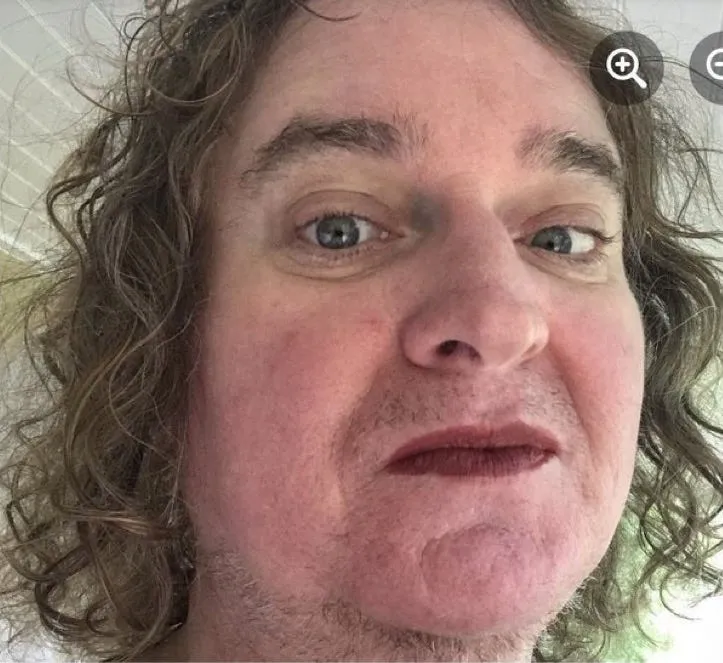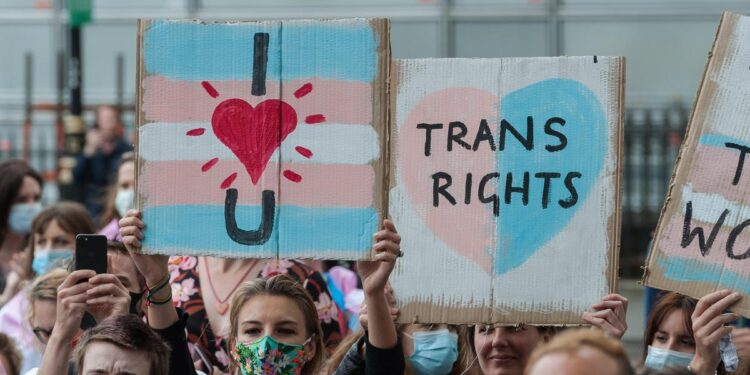A judge in Australia has just ruled that “sex is changeable”, an utterance that flies in the face not only of common sense but also of incontestable biological facts. For those of us who have been concerned about the ongoing capture of our major institutions by an ideology that demands acquiescence in the denial of reality, we had hoped that the judiciary might be immune. In Australia at least, this is evidently not the case.
The story began when Sall Grover, a former Hollywood screenwriter, established a new social media platform for women only in 2020 called “Giggle”. One of the innovations of the app was the introduction of facial recognition software to ensure that men could not participate. In the wake of #MeToo, this seemed like an uncontroversial notion.
The software wasn’t foolproof. A man who identifies as a woman and calls himself “Roxanne Tickle” was somehow accepted, and when the mistake was noticed he was barred from the app. For anyone who thinks there might be any ambiguity about Tickle’s sex, this is what he looks like:

Affronted at being denied access to a women’s only space, Tickle took Grover to court claiming discrimination. And now the Australian Human Rights Commission (AHRC) has ruled that this was indeed an instance of indirect discrimination (as opposed to direct discrimination, as it was not proven that Tickle’s “gender identity” was the discriminating factor). The ruling puts it this way:
A necessary part of proving that action has been taken by reason of a person’s gender identity, and therefore amounts to direct discrimination, is establishing that the alleged discriminator was aware of the person’s gender identity. The evidence goes no further than establishing that Ms. Tickle’s exclusion was likely to have been a byproduct of excluding those who were perceived as being men, by the use of visual criteria that failed to distinguish between cisgender men and transgender women.
We can all see the problem. A women-only app quite obviously will discriminate on the basis of sex, otherwise it will cease to be a women-only service. The law in Australia insists that “gender identity” is a protected characteristic, even though the overwhelming majority of people do not believe that such a thing exists. This is due to amendments to the Sex Discrimination Act that were passed by the federal parliament under the Labour government in 2013. Fast forward eleven years, and a judge has determined that one man’s belief that he has a gendered soul should automatically grant him the right to access women’s only spaces. Tickle has been awarded $10,000 and Grover will have to pay his legal costs.
Grover had relied on the definition of “women” in the UN’s Convention on the Elimination of All Forms of Discrimination Against Women (CEDAW). As it happens, this case has not tested this definition, as the judge explained:
I was not satisfied that the kind of gender identity discrimination alleged by Ms Tickle under s22 would be supported as an enactment of the Convention for the Elimination of All Forms of Discrimination Against Women (1979) (CEDAW). The respondents contended that this was because CEDAW grants protections only to women, and the word “women’”in CEDAW only means adults who were female sex at birth. I do not need to decide whether that is correct or not, because the way in which the term “discrimination against women” is defined in CEDAW means it refers only to discrimination that places women in a less favourable position than men. It therefore does not cover the kind of four discrimination that Ms. Tickle alleges in this case, which is discrimination that placed her in the same position as men.
At the very least, we can say that in the wake of this judgement the international definition of “women” still holds firm. And yet if a man can successfully take legal action for being denied access to a women’s service, this effectively means that single-sex spaces for women can no longer exist. The Australian judiciary has decided that it is illegal for women to organise in their own interests.
We have seen countless instances of men identifying their way into women’s spaces, from sports to hospitals and, perhaps most disturbingly, prisons. Most lesbian dating apps are now mixed-sex, and the option to filter out men is not permitted because this is considered “transphobic”. In other words, lesbians are being shamed for being same-sex attracted by the very organisations that are meant to support them.
All sexuality is discriminatory. It could hardly be otherwise. To suggest that women who are attracted exclusively to other women should include men in their dating pool is about as homophobic as it gets. That this is now codified into law should surely be a cause for concern for anyone who believes in the rights of minorities. And when it comes to women more generally, it is a clear-cut matter of safeguarding. Women’s spaces exist because 99% of sex crimes are committed by men and 91% of victims of sex crimes are female. This really shouldn’t be difficult to understand.
Of course Tickle is entitled to equal protection under the law. But he should not be entitled to enter spaces where women have decided to gather with their own sex. There will hopefully now be an appeal to the High Court, and with any luck the 2013 amendments to the Sex Discrimination Act will be deemed unlawful. There is a strong case here, as many have pointed out that it is unconstitutional to redefine “woman” as a matter of identity rather than biology.
Above all, we should all be chilled by that phrase “sex is changeable”, uttered by the judge as though any of us could possibly believe it. The law might well seek to upend reality, but that does not make it true. Not even the most senior judge in the world can simply decide that human biology no longer exists. Yet such is the power of this new religion of gender identity that even the judiciary will state falsehoods in its name. If nothing else, this ruling has settled once and for all the question of whether this ideology has seized control of our society. Case closed.
Andrew Doyle is a writer, comedian and broadcaster who hosts the GB News show Free Speech Nation. He is the author of Free Speech and Why It Matters and The New Puritans. He created satirical Left-wing activist Titania McGrath, whose two books are Woke: A Guide to Social Justice and My First Little Book of Intersectional Activism. This article was first published on his Substack. You can subscribe here.












To join in with the discussion please make a donation to The Daily Sceptic.
Profanity and abuse will be removed and may lead to a permanent ban.
Have you spoken to Dr Malcolm Kendrick, he works in carehomes, he’s been speaking out about this https://drmalcolmkendrick.org/2020/05/11/how-to-make-a-crisis-far-far-worse/
One of few remaining Doctors with ‘common sense’, recommend his book ‘Doctoring Data’ a real eye-opener.
One of the reasons for so many deaths in care homes is that it was a disaster waiting to happen
https://hectordrummond.com/2020/05/18/daphne-havercroft-covid-19-how-the-nhs-protects-itself-by-neglecting-the-elderly/
NSW following the same NHS protocol
Another reason for so many deaths in care homes is that the NHS and local authority goal is to spend as little money as possible on the care needs of the residents. Many of them are approaching the end of their lives and they are not getting the health care they need to reduce their risk of succumbing to serious diseases because the NHS downplays their health care needs to avoid having to provide the care it free at the point of need. Local authorities go along with this.
People whose care needs are primarily health as opposed to social care are legally entitled to have all their care paid for by the NHS, under NHS Continuing Healthcare (CHC).
Despite people living longer with complex health needs, the number deemed eligible for CHC has fallen and there is a post code lottery. This problem has been brewing for a long time, exacerbated by reduction in the number of acute hospital beds.
http://www.lukeclements.co.uk/continuing-health-care-funding-and-end-of-life-care/
https://www.telegraph.co.uk/news/2019/02/27/vulnerable-pensioners-dementia-facing-crippling-care-bills-following/
You would think that local authorities would push back against the NHS and not accept responsibility for people whose care needs might be primarily health needs and therefore outside the local authority’s legal remit, but they don’t and cave in.
http://www.lukeclements.co.uk/nhs-chc-and-supine-council-leaders/
Of course not everyone in a care home is eligible for NHS CHC, but such is the NHS enthusiasm to downplay all health needs, that there is a risk that provision of routine, health care, free at the point of need, including end of life and palliative care planning, is patchy at best, so the residents are sitting ducks when a nasty virus enters their care home.
Everyone in a care home is registered with a GP and many practices look after all the residents in a care home, doing the weekly equivalent of ward rounds. Therefore what risk assessments did GPs do before allowing hospitals to discharge recovering Covid-19 patients into care homes in order to protect their patients from unnecessary risk of harm and death?
I think the answer is in Dr Kendrick’s blog.
https://drmalcolmkendrick.org/2020/05/11/how-to-make-a-crisis-far-far-worse/
“The bullying began. Of course, it wasn’t called bullying, but hospitals needed to be cleared out and nothing and no-one was going to get in the way.”
Obviously there were no risk assessments.
Thanks for this – will have a look at these links. Very helpful.
would you knowingly give someone with ‘distressing shortness of breath’ a drug with ‘respiratory depression and respiratory arrest’ as a known side effect (according to manufacturer’s safety warning)